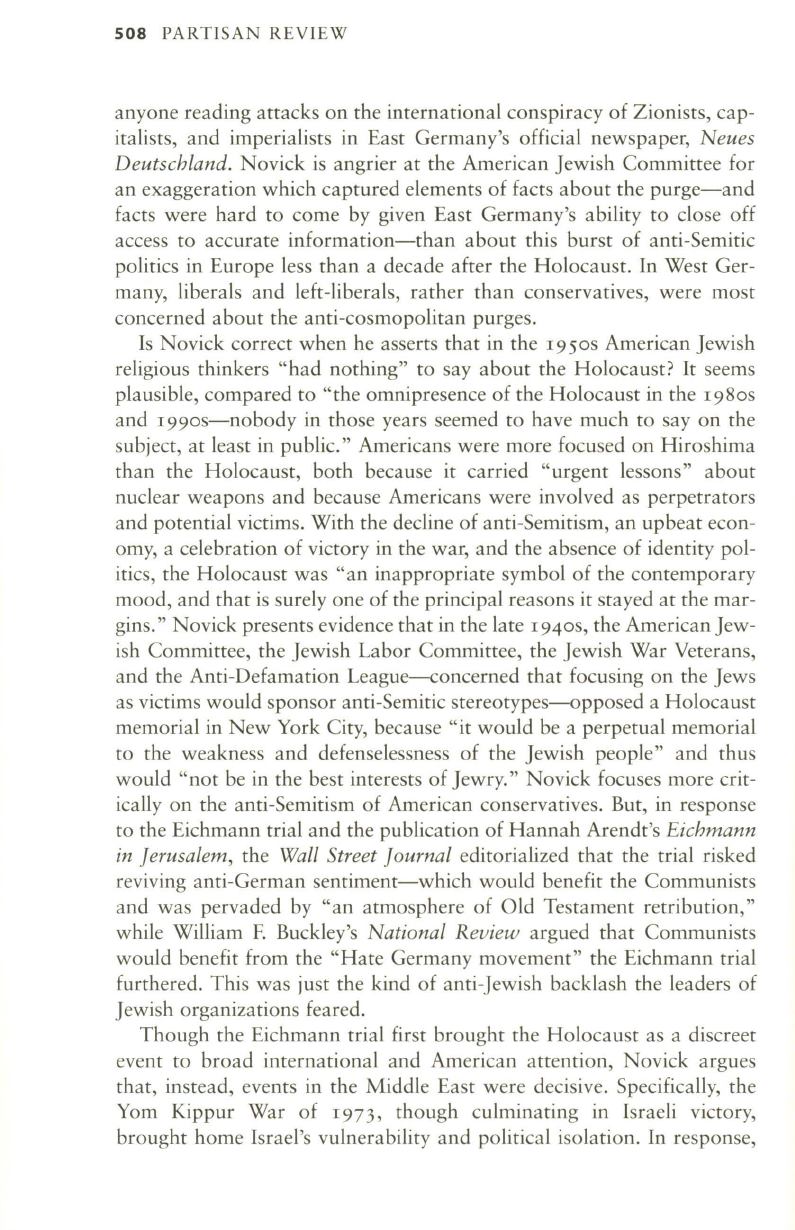
508
PARTISAN REVIEW
anyone reading attacks on the international conspiracy of Zionists, cap–
italists, and imperialists in East Germany's official newspaper,
Neues
Deutschland.
Novick is angrier at the American Jewish Committee for
an exaggeration which captured elements of facts about the purge-and
facts were hard to come by given East Germany's ability to close off
access to accurate information-than about this burst of anti-Semitic
politics in Europe less than a decade after the Holocaust.
In
West Ger–
many, liberals and left-liberals, rather than conservatives, were most
concerned about the anti-cosmopolitan purges.
Is Novick correct when he asserts that in the 1950S American Jewish
religious thinkers "had nothing" to say about the Holocaust?
It
seems
plausible, compared to "the omnipresence of the Holocaust in the 1980s
and 1990s-nobody in those years seemed to have much to say on the
subject, at least in public." Americans were more focused on Hiroshima
than the Holocaust, both because it carried "urgent lessons" about
nuclear weapons and because Americans were involved as perpetrators
and potential victims. With the decline of anti-Semitism, an upbeat econ–
omy, a celebration of victory in the war, and the absence of identity pol–
itics, the Holocaust was "an inappropriate symbol of the contemporary
mood, and that is surely one of the principal reasons it stayed at the mar–
gins." Novick presents evidence that in the late
I
940s, the American Jew–
ish Committee, the Jewish Labor Committee, the Jewish War Veterans,
and the Anti-Defamation League-concerned that focusing on the Jews
as victims would sponsor anti-Semitic stereotypes-opposed a Holocaust
memorial in New York City, because "it would be a perpetual memorial
to the weakness and defenselessness of the Jewish people" and thus
would "not be in the best interests of Jewry." Novick focuses more crit–
ically on the anti-Semitism of American conservatives. But, in response
to the Eichmann trial and the publication of Hannah Arendt's
Eichmann
in Jerusalem,
the
Wall Street Journal
editorialized that the trial risked
reviving anti-German sentiment-which would benefit the Communists
and was pervaded by "an atmosphere of Old Testament retribution,"
while William
F.
Buckley's
National Review
argued that Communists
would benefit from the "Hate Germany movement" the Eichmann trial
furthered. This was just the kind of anti-Jewish backlash the leaders of
Jewish organizations feared.
Though the Eichmann trial first brought the Holocaust as a discreet
event to broad international and American attention, Novick argues
that, instead, events in the Middle East were decisive . Specifically, the
Yom Kippur War of 1973, though culminating in Israeli victory,
brought home Israel's vulnerability and political isolation.
In
response,


